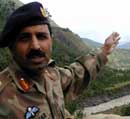Andrew
Maykuth Online
|
 |
Gen. Iftikhar Ali Khan |
CHAKOTHI,
Pakistan -- Pakistan and India routinely shelled each other across the
border here until the nuclear-armed neighbors recently declared a
cease-fire along the boundary where they have been dug in for more than
half a century.
Six months later, the unmarked 475-mile
Line of Control that divides the Himalayan region of Kashmir remains
remarkably peaceful. Life improved immensely in such frontier communities
as Chakothi, giving residents time to rebuild the local school, destroyed
last fall by Indian artillery.
"The cease-fire has given a ray of
hope to people," said Brig. Gen. Iftikhar Ali Khan, commander of the
Pakistani brigade that guards this section of the border.
Yet only the most optimistic believe the
cease-fire will be made permanent when India and Pakistan sit down next
month to explore a resolution to a dispute that has cleaved this region
since 1947, when the Britain partitioned its former Indian colony along
religious lines, granting independence to India and Pakistan. Muslim
Pakistan, occupying the northern third of mostly Muslim Kashmir, has
fought two wars over Kashmir with Hindu India.
"We are hopeful that maybe this
negotiation will result in a better life for Kashmiris," said Munir
Ahmad, 24, school principal in a camp populated by refugees displaced by
the uprising that has torn apart Indian-occupied Kashmir since 1989.
"We hope for an end of the killing."
At some border posts, the cease-fire has
provided an opportunity for long-separated relatives to get close enough
that they can shout greetings to each other across the divide.
But at the Chakothi post, only soldiers
face each other across the rugged boundary that crosses the Jhelum River,
swollen by the spring thaw as it races past terraced wheat fields and
orchards.
Khan, at a fortified viewing platform,
gestured at enemy soldiers peering back through binoculars from outposts
less than 200 yards away. Electronic sensors are mounted on the Indian
side to detect anyone brave enough to try to sneak through the minefields.
"It's not that easy for anyone to
get across without detection," he said. He denied Indian accusations
that Pakistan's army provided weapons and logistical support to the
Kashmiri militants. "This struggle is totally indigenous, being
fueled by Indian brutality," he said.
In a concrete bunker a mile from the border, Khan presented a slide-show briefing on the history of the conflict. The two nations nearly went to war again in early 2002, when they mobilized more than a million soldiers along the Line of Control after Kashmiri militants attacked India's parliament.
"The
situation over here became so volatile that even the slightest move might
have caused catastrophic consequences," he said, as a slide projected
on the wall behind him depicted a vibrant red mushroom cloud.